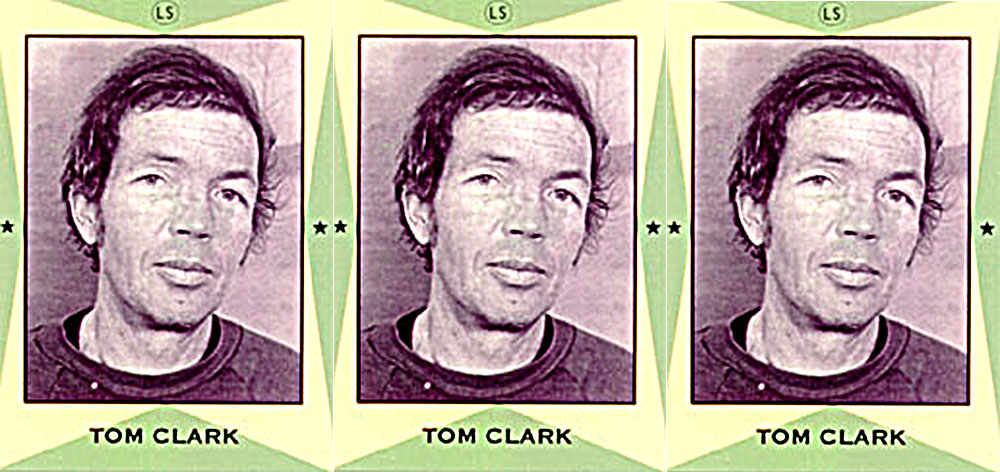For decades, as his health declined, Tom Clark lived on a busy street in Berkeley in a house with many steep stairs. Crossing, haltingly, one of those streets, he was struck by a car and killed on August 17.
One of the last times I saw him, he made fun of himself for his frailty, for the way he had to pause while walking in the neighborhood, and pause even more when he tried to get to his front door. But though he could have, he refused to move. His surroundings—mainly an enormous trove of books, magazines, newspapers, and his own voluminous works and manuscripts—would have been too hard, and time-consuming, to go through alone. And aside from his wife Angelica, he trusted no one to help.
I asked Tom if he would be interested in being interviewed. We both knew we didn’t have forever to think about it (I’m eighty-one; he was seventy-seven). My pitch was: “You’re probably the least known person in this country to have written, and published, over forty books. There’s a great diversity in subject and mode in what you’ve written. And you keep up obsessively with the literary and political world around you. Got to be some wisdom to communicate, no?”
Tom was polite but obviously totally uninterested. He listened to me and, without responding, said he had to go lie down. Some time later, when he hadn’t returned, Angelica—whom I’d known since their first days together in Bolinas in the late sixties—came and told me he was asleep, and there was no telling when he’d get up.
We emailed occasionally after that, but we never saw each other again. I liked him a lot and had always felt a bond with him. In fact, as I write this, I sense how nice it would be to have him here. We could be watching the A’s (Oakland’s baseball team, to whose fate he was emotionally linked) about to achieve what was thought to be an impossible climb to first place.
As so many of us do—have to do—Tom compartmentalized his mind and soul. A glimpse at his oeuvre gives a sense of this. Twenty-seven volumes of poetry. Biographies of Damon Runyon, Jack Kerouac, Charles Olson, Robert Creeley. Five novels (including one based on the life and work of Celine). And an array of other works (and troves of articles), including books on the baseball eccentrics Charles Finley and Mark Fidrych. Since 2009, he and Angelica have produced an astonishing daily blog, Beyond the Pale, of pictures, poetry, and prose, mostly centering on the endless horrors of refugee life in the Middle East, Asia, and Africa. Beyond the Pale was and is worth grazing for the visually gripping photos and the always apposite words.
I wrote to Tom about how hard it is sometimes to immerse oneself in such intensity, no matter how much one empathizes with the plight. Amazingly, he called me to talk. After a long litany of health complaints, he said he was tired and had to go. We never discussed the blog. But he did reiterate his gratitude for my Sunday-morning classical-music radio program, to which he was a devoted (and erudite) listener.
I’m left remembering our days in Europe, when he was the poetry editor and I was the Paris editor of The Paris Review. It’s hard for those who weren’t alive then to imagine the circumstances of our lives, especially our marginal literary/publishing lives. For most of that period, neither Tom nor I had phones. Our addresses changed often—especially his, since I had the constancy of a tiny one-room office in Paris. To send manuscripts and proofs back and forth was arduous and slow. When I visited him in Brightlingsea, Essex, one time (he was teaching, sort of, in Cambridge), we spent hours comparing notes on the past, like our childhood baseball devotions (he had been a hot-dog vendor in Chicago), and lamenting how difficult it was to follow the White Sox and the Dodgers from exile.
I’m writing this the day after he died, and I’m looking at the issues we worked on together, dated Summer–Fall 1964 through Spring 1966 (The Paris Review was supposed to appear quarterly but never did back then, due to endless financial crises and the irregular qualities of our New York boss, George Plimpton). The poetry includes works by Larry Eigner, Louis, Zukovsky, Charles Olson, Robert Bly, Ted Berrigan, Allen Ginsberg, Gary Snyder, Denise Levertov (a rare woman!), Philip Whalen, Ron Padgett, and Aram Saroyan. Tom’s wonderful interview with Ginsberg was published in the Spring 1966 issue. Tom remained poetry editor until 1973, when he moved to California for a long—and marginal in every sense—life as a writer and father. Every year, a book or two emerged. We are left with them as his shining legacy.
Here are some of Tom’s last words, from his final blog post, on the day of his death, titled “the dance of conquest is going to have to wait”:
When your twittering machine starts feeling kind of neglected… pouting there beside your pillow as though it thinks maybe you don’t love it any more… and in the night you hear its familiar call… beckoning… something deep in your heroic teuton outerboroughs bonespurs awakens… as you go into motion your imperial robe pinches a bit… you loosen the belt strap… your twittering machine won’t let you rest… tweet with me now, it croons impatiently… your tiny fat fingers do an anxious little jig around it and now you hardly know what you’re doing… you’re in power glide… then its strange ravening dead bird mouth beak opens and… out comes a sound only other dead birds and Republicans can hear!
from The Paris Review https://ift.tt/2nTX7Du

Comments
Post a Comment